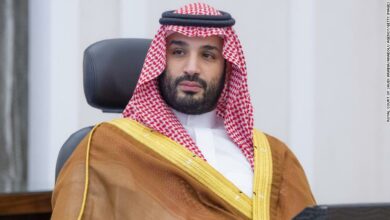Liberal Saudi Arabian columnist Abdul Rahman al-Rashid abruptly announced his resignation from his position as manager of the Dubai-based Al-Arabiya satellite news network on Tuesday.
Both al-Rashid and Al-Arabiya's editor-in-chief declined to provide any reasons for the sudden decision.
“Some staff members at Al-Arabiya confirmed al-Rashid’s resignation, but no reason was given for the move,” Kabar daily reported.
“It remains unclear whether he resigned or was sacked," the newspaper added, going on to note that the resignation had followed the broadcast of a controversial program entitled "Islam and the West."
"The program contained serious offenses against Sheikh Mohammed bin Abdul Wahab,” an influential 18th century Arabian preacher who called for the strict adherence to Islamic law, according to Kabar.
One of the guests featured on the program had said that the West had "stigmatized" Islam as a "religion of violence and extremism" as a result of the Wahhabist interpretation of Islam. The guest had gone on to say that Saudi Arabia was responsible in part for western misperceptions about Islam and Muslims.
Other Saudi press reports suggested that al-Rashid had tendered his resignation after his daily column in pan-Arab daily Al-Sharq Al-Awsat newspaper had been banned. Al-Rashid's column in Al-Sharq Al-Awsat, which is published out of London, were known for their relatively liberal orientation.
Before joining Al-Arabiya, al-Rashid had been editor-in-chief of Al-Sharq Al-Awsat for five years, during which he became known for writing daily columns that frequently sparked controversy in the Arab world.
Whatever the reasons, prominent Al-Arabiya presenter Turki al-Dakhil noted on his Twitter page that al-Rashid's resignation could lead to additional resignations by some of his colleagues at the network who have expressed solidarity with his position.
Al-Rashid’s resignation represents the latest example of mounting tensions between certain liberal-minded local journalists and the Saudi religious establishment, which enjoys the support of influential members of the Saudi royal family.
In March 2009, a group of hard-line Saudi religious figures called on the Saudi minister of information to halt efforts to "liberalize" the media by removing Saudi women from state television. One year earlier, an ultra-conservative cleric declared that the owners of Arab entertainment channels could face the death penalty for allowing what he saw as excessively liberal programming.
In recent years, Saudi state media has allowed the introduction of female television presenters. But other Arab satellite channels, many owned by Saudi princes or businessman close to the royal family, have gone much further with entertainment shows that critics say ape western television styles.
Saudi King Abdullah Bin Abdulaziz has promoted cautious reforms in an effort to combat perceived radicalism after the 9/11 attacks in New York and Washington in 2001 focused international attention on the influence of hard-line Wahhabi Islam in the kingdom. But analysts say these reform efforts have been strenuously resisted by the religious establishment, which is backed by influential Interior Minister Prince Nayef bin Abdul Aziz.
Al-Rashid has managed Al-Arabiya since 2004. Before this, he worked for Saudi magazine Al-Majalla for ten years, also serving as foreign correspondent in Washington for Saudi newspaper Al-Jazeera until 1985.




